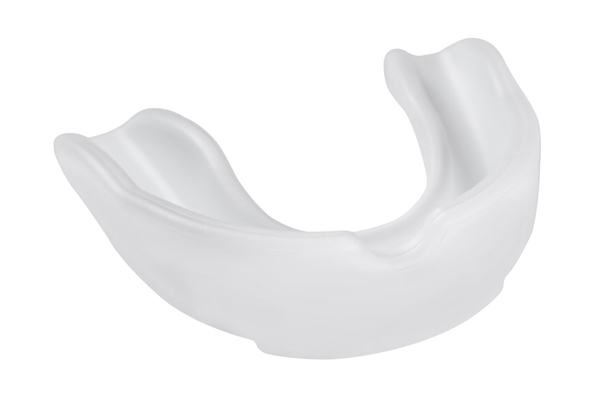Mouthguards/Night Guards/Bruxism
 The terms "mouthguard" and "night guard" refer to the same basic appliance, a plastic covering that is worn over the teeth for protection. There are three major types of mouthguards: stock protectors, boil and bite protectors, and custom-fit protectors. The first two options are store-bought and inexpensive. However, they are usually bulky, uncomfortable, and less effective than the custom-fit alternative. At Mineola Dental Care, we specialize in custom-fit mouthguards because we believe they are the ideal solution, whether you need one for physical activities or to combat bruxism. The terms "mouthguard" and "night guard" refer to the same basic appliance, a plastic covering that is worn over the teeth for protection. There are three major types of mouthguards: stock protectors, boil and bite protectors, and custom-fit protectors. The first two options are store-bought and inexpensive. However, they are usually bulky, uncomfortable, and less effective than the custom-fit alternative. At Mineola Dental Care, we specialize in custom-fit mouthguards because we believe they are the ideal solution, whether you need one for physical activities or to combat bruxism.
Why You May Need a Mouthguard
We recommend mouthguards for anyone, children and adults, involved with physical activities that put them at risk for injury or trauma. This includes contact sports such as ice hockey, football, soccer, basketball, boxing, field hockey, and lacrosse. We may also recommend a mouthguard if you participate in recreational activities like skateboarding, mountain biking, and rollerblading. Even those who participate in gymnastics could benefit from wearing a mouthguard.
In general, mouthguards are used to cover the upper teeth. However, Our doctors may recommend a mouthguard for the lower teeth as well, specifically if you wear braces or another fixed appliance. Your custom-fit mouthguard should be comfortable, durable, and resistant to tears. A good mouthguard is also easy to clean and does not affect your breathing or speech.
What Is Bruxism?
Bruxism, also known as teeth grinding, affects roughly 30 to 40 million Americans. Bruxism can have a variety of causes, from stress and anxiety to malocclusions (misaligned bites). In rare cases, bruxism can be the result of certain diseases or medications. More often than not, most people are unaware that they suffer from bruxism because it happens during sleep. This is referred to as nocturnal bruxism.
If bruxism remains untreated, it can cause the outer layers of the enamel to wear away. It can also damage existing dental fillings and crowns. It is important to treat the disorder before it causes major damage.
Those with bruxism may experience the following symptoms:
| • |
TMJ disorders or pain in the jaw
|
| • |
Swelling on the side of the lower jaw
|
| • |
Damaged teeth or broken dental appliances
|
| • |
Persistent facial pain
|
| • |
Rhythmic contractions of the jaw muscles
|
| • |
Morning headaches
|
| • |
Grinding sounds during sleep, usually reported by a sleep partner
|
| • |
Pain or discomfort when opening the mouth |
Why You May Need a Night Guard
A night guard is one of the best ways to treat nocturnal bruxism. The plastic appliance will shield your enamel from the pressures of your bite. Your night guard may take some getting used to, but after about a week it will begin to feel normal. Because it is custom-fit, you should not experience any pain or discomfort. If you chose not to wear a night guard, you might be putting yourself at risk for serious complications later down the line. Stress-reduction techniques are also a popular way to reduce the harmful effects of bruxism.
Schedule a Consultation
If you think you could benefit for a mouthguard call (516) 873-9511, and schedule your consultation appointment now! |